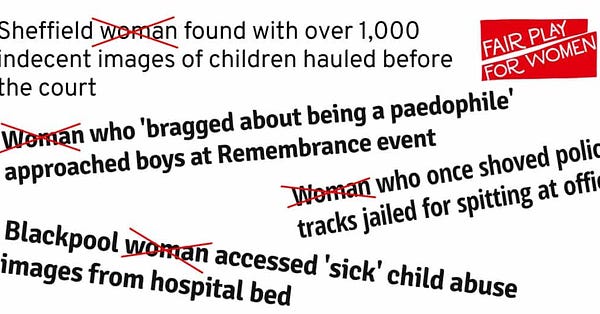Not Our Crimes
Crimes committed by men are increasingly being presented in the media as being committed by women. News stories are frequently writing about violent males using she/her and often include the word “women” in headlines when it is in fact a male perpetrating the crime. Gender identity is taking precedent over biological reality even in cases of sexual crimes and violence.
The Independent press standards organisation’s (IPSO) current guidelines are allowing inaccurate and misleading reporting. In some cases men are not only reported as women but also female.


Labeling violent men as women is having a myriad of consequences including reducing the safety of women in prisons, not allowing women to name male violence against them and on statistics of crimes. For example, in 2017 a man who identifies as a woman and convicted of attempted murder increased the number of women convicted of that crime in the UK by 20% that year. The media are being complicit in a dangerous lie when they label male criminals as women and female, perpetuating a falsehood that many readers will take at face value.


We know the vast majority of violent crimes are committed by males. Statistics from 2019 tell us that 95% of the prison population are men. Women are more likely to be in court for less severe offences. TV licence evasion was the most common offence in 2019, accounting for 30% of all female convictions.
It is an insult that these predominantly male crimes are being reported as if women were committing them on an increasing scale. It is important not just for accuracy, but to society and our perception of crime and risk. Most importantly it’s vital to the victims of the crime who deserve to have the truth reported. We need to make our voices heard when we see this insulting, inaccurate reporting.
Call to Action
Highlight inaccurate stories, use #notourcrimes on social media and comment directly on inaccurate stories.
Follow the actions of Keep Prisons Single Sex and Fair Play for Women who are doing great work pushing against this.
Complain to news outlets every time you see inaccurate reporting. Some contact emails and complaints pages are listed below. You can also contact IPSO.
IPSO: inquiries@ipso.co.uk
The Times: feedback@thetimes.co.uk
Sunday Times: https://www.thetimes.co.uk/static/the-sunday-times-editorial-complaints
Telegraph: https://www.telegraph.co.uk/contact-us/editorial-complaints/
The Guardian: guardian.readers@theguardian.com
Independent: https://www.independent.co.uk/service/contact-us-759589.html
Daily Mail/Mail Online/Mail on Sunday: corrections@mailonline.co.uk
Daily Mirror/Sunday Mirror/Sunday People/Mirror Online: feedback@mirror.co.uk
The Sun: editorialcomplaints@the-sun.co.uk
Daily Star: starletters@dailystar.co.uk
Daily Express/Sunday Express: express.expressletters@reachplc.com
The Metro: correct@ukmetro.co.uk
Evening Standard: https://www.standard.co.uk/service/code-of-conduct-complaints-7467885.html
The i newspaper: reader@inews.co.uk



